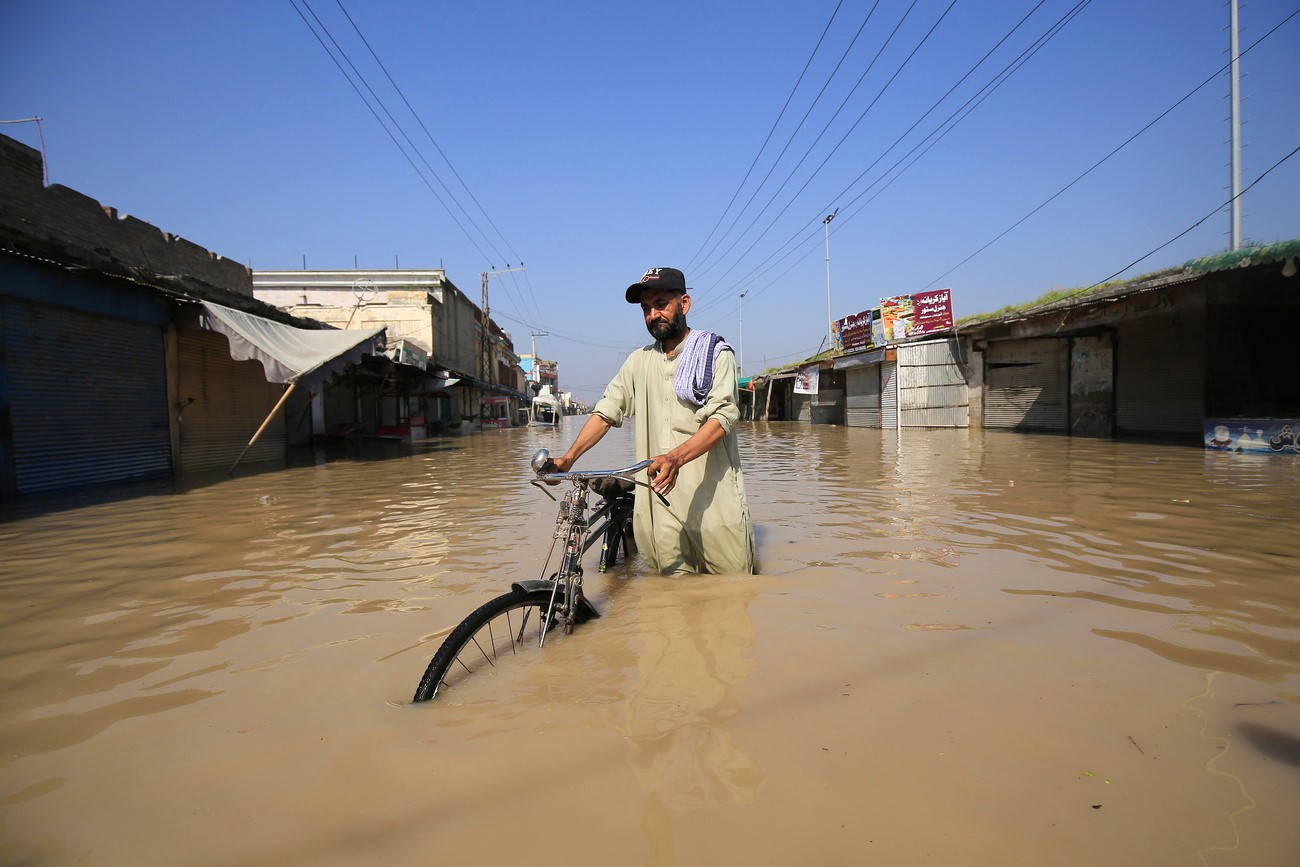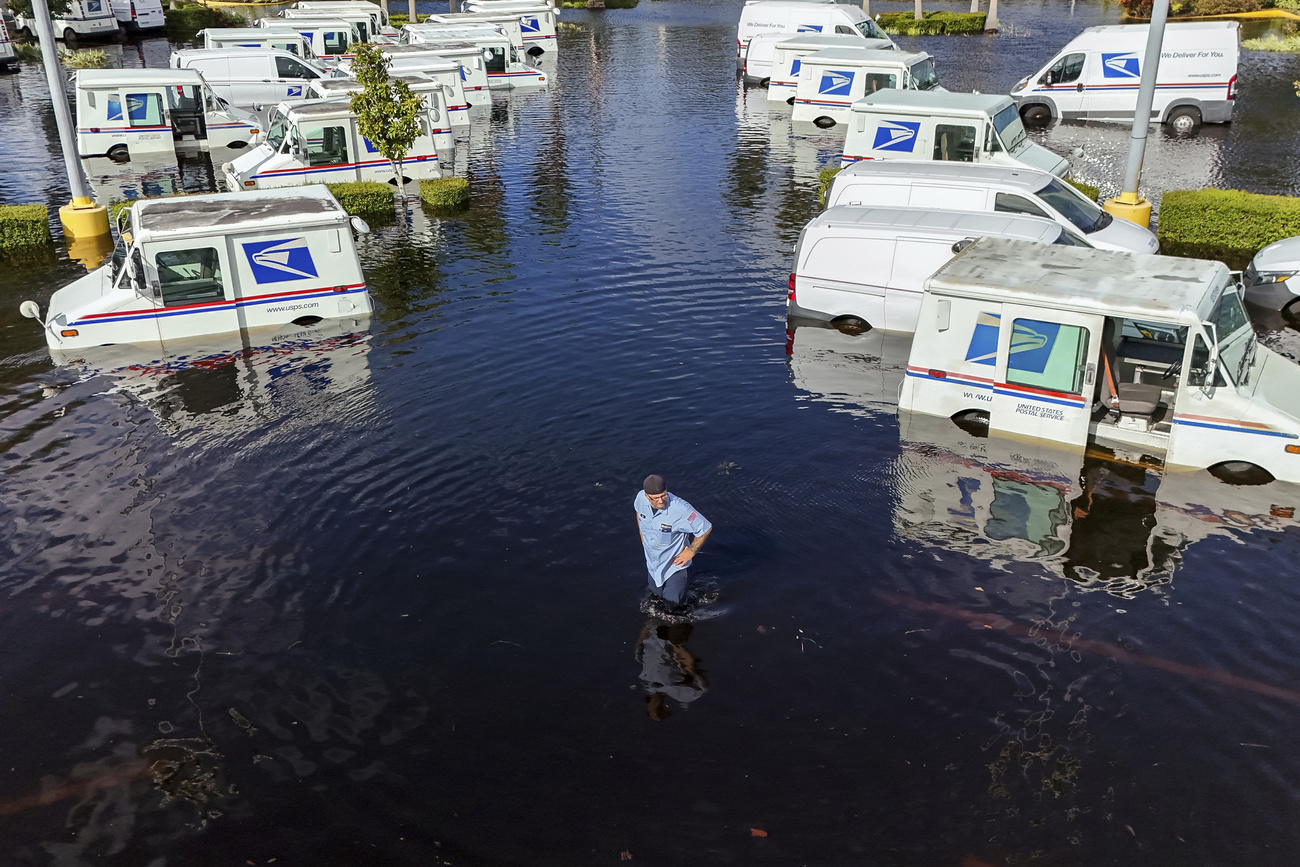Socar has around 200 petrol stations dotted across Switzerland.
Keystone / Urs Flueeler
Socar, Azerbaijan’s state energy company, is a key source of public funding for the country. It also relies heavily on business in Switzerland, where it has not escaped scrutiny.
As another petrostate playing host to the United Nations climate conference (COP29), the central Asian country of Azerbaijan is being entrusted to forge international agreements over decisive issues such as climate finance and transparency in carbon markets. Its state oil-and-gas company, a backbone of the country’s economy, has meanwhile built a solid if controversial business presence in Switzerland.
With roughly 200 Socar petrol stations located throughout the Alpine country, Swiss drivers are familiar with their green, red and blue logo. Some may also have loyalty cards for the Migros retail chain handy when picking up a few last-minute groceries at the pumping stations’ Migrolino shops, due to a franchise agreement with Azerbaijan’s state energy company.
But Socar, the Azeri company, has also been central in setting the stage for this year’s global climate conference. COP29’s president is Mukhtar Babayev, Azerbaijan’s ecology and natural resources minister and a former Socar official. The nation’s head of state, Ilham Aliyev, was Socar’s vice-president until he succeeded his late father as the country’s leader in 2003.
“Azerbaijan is Socar, and Socar is Azerbaijan,” Altay Goyushov, formerly a history professor from Baku State University, told SWI swissinfo.ch during a recent visit to Geneva. While the country produces only 1% of the world’s oil and gas, its fossil fuels make up 90% of its exports and 64% of government revenues.

Azerbaijan’s fossil fuels make up 90% of its exports and 64% of government revenues.
Keystone-SDA
Azerbaijan touts ‘greening’ of war zone with Socar support
Weeks after Baku announced it would host COP29, Socar proclaimed the creation of a green energy subsidiary, a move that critics allege involved posturing with little impact. In 2023, according to the World Benchmarking AllianceExternal link, Socar ranked 91 out of 99 oil and gas firms in terms of climate credentials.
The Azeri government organised a media tour for foreign journalists to areas of Nagorno-Karabakh earlier this year to showcase the “green” reconstruction of territories captured during its long war with Armenia. Azerbaijan’s national climate plan submitted to the UN climate process states: “In order to revitalise the territories liberated from occuption”, it would implement projects such as “green energy” zone, “green” agriculture, “green” transport, “smart” city, “smart” village and reforestation.
More

More
Switzerland to call for climate finance contributions from China and Russia at COP29
The military operation in Nagorno-Karabakh, which ended in December 2023, left the area void of its Armenian population, which until recently represented its majority.
NGOs Urgewald and Bankwatch Network allegeExternal link that Socar has been complicit in the military operations, which legal experts say amounted to “war crimes”. Socar contributes to the government’s nationalist propaganda in social media posts.
Over the past year, the government has also cracked down hard on dissent, arbitrarily sentencing journalists, civil society members and anyone critical of the government. Reporters Without Borders put the country near the bottom of its press freedom index at 167 out of 180.
“It is the backbone of the government,” says the Azeri professor Goyushov of Socar’s role in repression by Baku. “It is because of the strength of Socar that all of these things are happening.” Goyushov now teaches at Science Politiques in Paris, having left Azerbaijan following a government campaign accusing him of being a traitor, which he denies.
Migros, Swiss government under scrutiny
Amid the repression and what the European Union parliament and Armenia have said amounted to “ethnic cleansing” in Nagorno Karabakh, Migros has come under growing pressure for a partnership its Migrolino subsidiary concluded with the state-owned energy firm Socar, which took over the Swiss-based petrol stations from Esso in 2012.
Civil society groups in Switzerland, including the Swiss-Armenian AssociationExternal link and Christian Solidarity InternationalExternal link, have condemned the business deal.
In 2023, some members of the Swiss parliament, also incensed by the business relationship, wrote to Foreign Minister Ignazio Cassis in protest. According to the newspaper BlickExternal link, the letter read: “Switzerland must stop financing the military attack and ethnic cleansing.”
A spokesperson from the Swiss foreign ministry said that Switzerland “expects Swiss-based companies to respect human rights in their business activities”.
More

More
COP29: Switzerland and the world under pressure to deliver carbon cuts
In an email response to questions from SWI swissinfo.ch, Migros spokesperson Estelle Hain wrote: “Neither Migrolino AG nor Migros have any contacts with Azerbaijan. However, Migrolino AG is bound to Socar Energy Switzerland through long-term contracts under Swiss law.”
“Migros regrets that conflicts have arisen in the region,” Hain added. “It explicitly welcomes dialogue and diplomatic efforts for a peaceful resolution to the conflict.”
Emin Huseynov, an Azeri government critic who was forced into exile in Switzerland in 2015, said that governments had the opportunity to put pressure on Baku ahead of the UN climate conference but failed to do so, preferring instead to work with Azerbaijan and provide it with development cooperation funding.
“Civil society in the country must act, but they are not receiving any support from like-minded states, including Switzerland,” he said.
Geneva-based Socar trading office in web of suspicious payments
Socar’s energy trading office is located in Geneva, below a rooftop sign visible from the Swiss city’s riverside. Mariam Almaszade, recently namedExternal link by newspaper Le Temps as one of the 100 personalities shaping French-speaking Switzerland, has headed the office since 2018, marketing Azeri oil and trading third-party oil products. She had previously worked for several Geneva and Baku-based NGOs, among them the International Federation of the Red Cross and Red Crescent Societies and the UNHCR, according to Socar Trading.
The Socar trading office has come to the mediaExternal link’s and authorities’ attention in recent years. Investigations by Swiss NGO Public EyeExternal link and other organisations into a Maltese power plant construction deal in 2017 claim that “suspicious” payments worth millions of dollars were made to a Dubai-registered company, 17 Black. Socar Trading had a 33% stake in the deal, known as the Eurogas project.
The inquiry by the Daphne Project investigative collaboration found that Socar Trading was associated with a Maltese businessman, Yorgen Fenech. The latter is now in prison for his alleged role in the killing of Maltese journalist Daphne Caruana Galizia shortly after she received confidential emails from the Eurogas consortium as part of her own inquiry into money laundering.
Maltese authorities found that funds had been transferred to Fenech’s offshore company from another shell company by an Azeri frontman, while payments from Fenech’s accounts were reportedly sent to the accounts of two senior Maltese officials. These two officials were subsequently forced to resign from Valletta’s cabinet.
The Eurogas project in Malta, which was to process liquefied natural gas from Socar, had been supervised from Geneva by a British-Azeri national formally engaged as a consultant with Socar Trading. This consultant had previously worked with Fenech on a wind power project in Montenegro.
The newspaper Tribune de GenèveExternal link, meanwhile, found that during part of the time that the Socar Trading CEO worked at a commodities trading firm in Geneva, managing the accounts of its Azeri founder and businessman, she was the sole director of Virgin Island-registered Crowbar Holdings. That holding company, owned by the Azeri businessman, had allegedly transferred $2.3 million to 17 Black, Fenech’s company.
Almaszade has previously denied knowledge of transfers made to Fenech’s company and did not respond on the record to questions about the transfer.
The conclusions of the Maltese prosecutor’s inquiry into 17 Black are yet to be published.
Edited by Veronica DeVore/gw
*The identity of the author has been withheld from this story for security reasons
More

